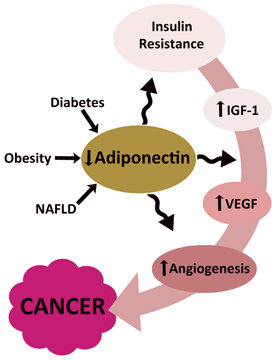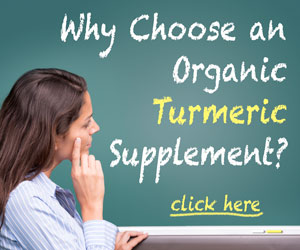
Turmeric Blocks the Cancer Connection to Metabolic Conditions
The effects of turmeric's compounds against metabolic syndrome diseases could also prove helpful in preventing cancers associated with chronic inflammatory conditions. (vii.80-81)
Metabolic Conditions Associated with Increased Cancer
Breast cancer is often linked to obesity, while high blood pressure, triglycerides, and obesity are linked to increased risk for cervical cancer. Other studies show that obesity and non-alcoholic fatty liver disease (both metabolic syndrome conditions) are associated with higher risk of colon cancer. Type 2 diabetes is associated a higher risk of endometrial cancer. (vii.4, 80-83)
Increased cancer risk may be due to reduced levels of adiponectin and/or high levels of growth factors (e.g., VEGF and IGF-1) found in people with metabolic syndrome. These have also been associated with higher risk of a number of cancers, including: (vii.4, 81-83)

Figure VII.4: Metabolic Syndrome Pathway to Cancer
- Breast cancer
- Colon cancer
- Endometrial cancer
- Prostate cancer
- Esophageal (throat) cancer
- Pancreatic cancer (in men)
Low adiponectin levels allows cancer-promoting growth factors and the development of new blood vessels (a process called angiogenesis) that cancer needs to grow. (vii.4)
Breast Cancer and Fat Cells
Now researchers have discovered that at the cellular level, fat cells secrete visfatin. An inflammatory protein, visfatin promotes the development and progression of breast cancer. Results of lab studies show that curcumin blocks production of visfatin and inhibits its cancer-promoting and invasive activity. (vii.80)
How Can Turmeric Help?
Substances such as drugs and dietary factors that stop angiogenesis can help prevent cancer. A number of turmeric compounds can prevent cancer-promoting angiogenesis found with metabolic syndrome diseases. In particular, they inhibit growth factors and/or promote adiponectin, blocking angiogenesis. (vii.4, 32)
| Turmeric Compound | ↓ Growth Factors | ↑ Adiponectin | ↓ Visfatin |
|---|---|---|---|
| Alpha-linolenic acid (vii.18) | ♦ (vii.19) | ♦ (vii.36) | |
| Ar-turmerone (vii.20) | ♦ (vii.37-38) | ||
| Caffeic acid (vii.20) | ♦ (vii.21) | ||
| Curcumin | ♦ (vii.32) | ♦ (vii.37-38) | ♦ (vii.80) |
| Eugenol (vii.20) | ♦ (vii.23) | ||
| Limonene (vii.20) | ♦ (vii.24) | ||
| Linoleic acid (vii.39) | ♦ (vii.38) | ||
| Myricetin (vii.25) | ♦ (vii.26) | ||
| Niacin (vii.29) | ♦ (vii.22) | ||
| Resveratrol (vii.27) | ♦ (vii.32) | ♦ (vii.84) | |
| Quercetin (vii.25) | ♦ (vii.32) | ♦ (vii.84) | |
| Vitamin C (vii.29) | ♦ (vii.30) | ||
| Vitamin E (vii.29) | ♦ (vii.38) | ||
| Whole turmeric extract | ♦ (vii.37) |
Join the 1000s of People Who Are Discovering the Benefits of Turmeric.

Healthceuticals® Turmeric Curcumin Complex
100% Certified
Organic ingredients
- Organic Turmeric Extract - standardized to 95% curcuminoids.
- Organic Whole Turmeric - provides full spectrum antioxidant, anti-inflammatory turmeric benefits, including turmerones and numerous vitamins, minerals, and phytonutrients
- Organic Black Pepper Extract - standardized to 95% piperine; dramatically enhances bioavailablity.
- Organic Phospholipids - markedly improve absorption.
- Organic Ginger - works synergistically with turmeric to provide more powerful benefits.
- Absolutely FREE of potentially harmful additives and fillers such as magnesium stearate.




